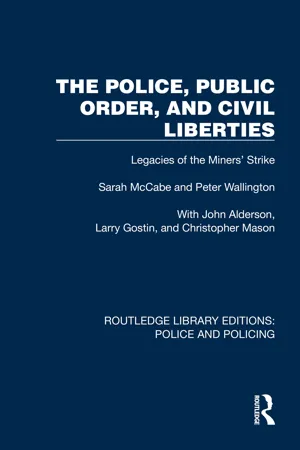
The Police, Public Order, and Civil Liberties
Legacies of the Miners' Strike
- 210 pages
- English
- ePUB (mobile friendly)
- Available on iOS & Android
The Police, Public Order, and Civil Liberties
Legacies of the Miners' Strike
About This Book
What role should the police have in an industrial dispute? How were they led into a partisan role in assisting the defeat of the 1984-5 miners' strike? Widespread concern over police road-blocks, allegations of police and picket violence, and the huge numbers of police used to maintain order and access to work led the National Council for Civil Liberties to set up an inquiry into the policing. The Inquiry Panel produced an interim report – but the NCCL disowned it, because of its acknowledgement of the rights of working miners as well as striking ones. The members of the Panel – who included former Chief Constable John Alderson and NCCL General Secretary Larry Gostin – then resigned, but continued work as a group of private individuals. Originally published in 1988, this book is their final report.
The report describes the policing of the strike in detail from a range of published, unpublished, and eyewitness sources. The strike is set in the context of developments in law and policing before and since. The authors are able to provide a unique and authoritative perspective, analysing both the events of 1984-5 and the longer-term trends and problems, based on a clear recognition of the basic issues and conflicts of civil liberties involved. In their conclusions and recommendations the authors present an informed view of the use of the police during the strike, the breakdown of the system of police accountability, and the policies developed since the strike. Their findings point to the need for a Bill of Rights to cover civil liberties during industrial conflict, and the need for a new picketing Code of Practice.
The Police, Public Order, and Civil Liberties will be essential reading for all concerned with the police, industrial relations, and the political and constitutional system. It will also be of value to all who need a clear and unbiased view of one of the key events in British post-war history.
Frequently asked questions
Information
Table of contents
- Cover
- Half Title
- Title Page
- Copyright Page
- Original Title Page
- Original Copyright Page
- Table of Contents
- The authors
- Preface
- Part I Issues and background
- Part II The miners’ strike March 1984–March 1985
- Part III Aftermath of the strike
- Part IV Conclusions and recommendations
- Appendices
- References and selected bibliography
- Index